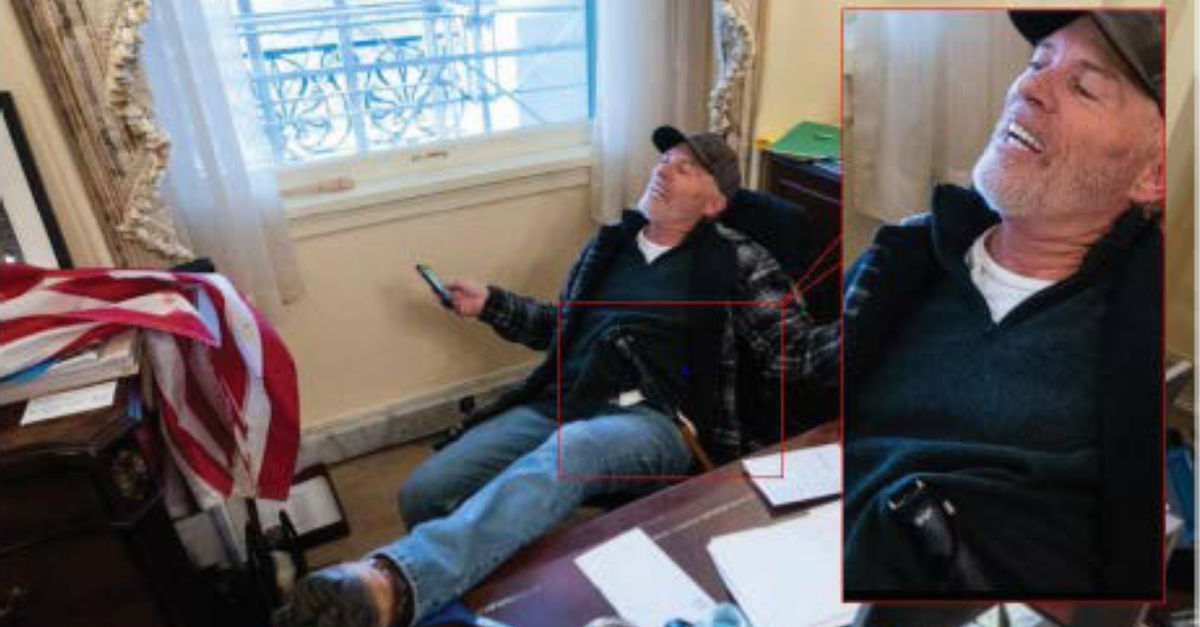
Richard Barnett, who kicked up his feet on a desk in Speaker Pelosi’s office, had a stun gun at the time.
The alleged U.S. Capitol invader photographed on Jan. 6 putting his foot up on a desk inside House Speaker Nancy Pelosi’s office with a stun gun in his pants asked a federal judge to free him up to buy and sell classic cars on Tuesday.
During a less than half-hour hearing on Tuesday, U.S. District Judge Christopher R. Cooper asked whether Richard “Bigo” Barnett’s car trade is a business, or more of a “side hustle.”
Barnett’s lawyer Joseph McBride described his client’s business as a lifelong hobby that became a primary source of income following his ongoing prosecution in connection with the Jan. 6th siege of the U.S. Capitol.
“This is the only way that he has the opportunity to make ends meet, provide for his family and pay for his legal defense,” McBride told the court.
Federal prosecutors opposed giving Barnett greater freedom of movement.
“The government does oppose the change in conditions at this point,” Assistant U.S. Attorney Mary Lyle Dohrmann told the judge, saying that she does not know what verification pre-trial services is performing to monitor Barnett.
Described by one federal judge as “brazen, entitled and dangerous,” Barnett has been awaiting trial on various charges in connection with the Jan. 6th siege on the Capitol. The chief judge of the District of D.C. previously and emphatically kept Barnett in pre-trial detention, citing the note that he left the California Democrat. “Bigo was here, you biatch,” said Barnett’s note to Pelosi.
Since his detention order, the D.C. Circuit heightened the standard for keeping those accused for breaching the Capitol locked up pending trial, and Barnett was released in April.
Life has been hard on the outside for Barnett, professionally, according to his lawyer.
“During that time Mr. Barnett was terminated from his career position as a window salesman, which was his primary source of his income,” McBride wrote in a letter on Monday. “Mr. Barnett’s second job of buying and selling classic cars is now his primary source of income. Consequently, his ability to travel for work is crucial to his ability to pay his bills, provide for his family, and fund his legal defense.”
Barnett currently must seek a judge’s permission for traveling more than 50 miles from home, under his terms of release.
That arrangement is “not practical” for someone living in rural Arkansas, like Barnett, according to McBride.
Barnett’s defense wants the judge to grant pre-trial services the ability to secretly approve work-related travel and shield any requests from the “prying eyes of the public.”
Judge Cooper gave the government an opportunity to file a motion opposing that arrangement.
If Barnett has been protective of his privacy, he has a curious way of showing it. The Arkansas man appeared recently on Russian state-run television to depict himself as a victim of government persecution. Barnett was also quoted speaking to the U.S. press in the immediate aftermath of the siege of the Capitol, including statements that prosecutors quoted in court papers.
The next hearing date in Barnett’s case has been scheduled for Aug. 24th at 10 a.m. Eastern Time.
Prosecutors will try to arrange a tour of the U.S. Capitol for Barnett’s legal team to prepare for their defense that same month.
(Image via a screenshot from court records)